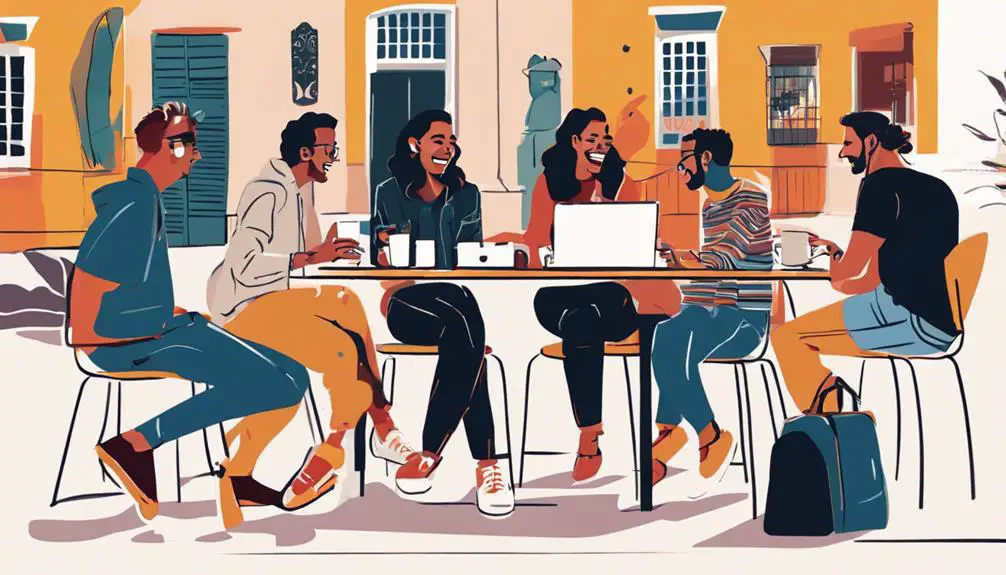When meeting up with Spanish speakers, use casual phrases like ¿Quieres ir al cine? or Vamos al parque for a relaxed hangout. For a coffee date, suggest ¿Quieres tomar un café? If you're planning a night out, ask ¿Quieres ir a un bar? or Vamos a una discoteca. Mastering verb conjugations and pronouns is key for clear communication. Tosound natural, use slang expressions like ¿Quedamos? or Vamos a pillar. Learn essential phrases for travelers, like ¿Dónde está…? and ¿Cuánto cuesta…, to navigate everyday interactions. Explore further to uncover more nuances of Spanish slang and cultural immersion.
Casual Meetups and Hangouts

When planning casual meetups and hangouts with friends in Spanish, you'll frequently use phrases like '¿Quieres ir al cine?' (Do you want to go to the movies?) or 'Vamos al parque' (Let's go to the park). These phrases will help you suggest and agree on casual activities with your friends.
For a relaxed gathering, you might say '¿Quieres tomar un café?' (Do you want to grab a coffee?), which is a common way to propose a casual coffee chat. If the weather permits, you could suggest a 'paseo por el parque' (park stroll), a popular activity in many Spanish-speaking countries.
When making plans, you can also use phrases like '¿Qué tal si vamos al centro?' (How about we go to the city center?) or 'Vamos a dar un paseo' (Let's go for a walk). These phrases will help you propose and agree on casual activities with your friends.
Remember to use the correct verb conjugations and pronouns to make sure your suggestions are clear and polite. By mastering these phrases, you'll be well on your way to planning casual meetups and hangouts with your friends in Spanish.
Planning a Night Out
Planning a night out with friends in Spanish often begins with asking '¿Quieres ir a un bar?' (Do you want to go to a bar?) or suggesting 'Vamos a una discoteca' (Let's go to a nightclub). Once you've chosen a destination, knowing some basic phrases to navigate the night becomes crucial.
| Expression | Translation |
|---|---|
| ¿Cuánto cuesta la entrada? | How much does the entrance cost? |
| ¿Hay una tarifa de entrada? | Is there a cover charge? |
| ¿Dónde está el baño? | Where is the restroom? |
When you're out, remember to respect nightclub etiquette by being mindful of the dress code, arriving early to avoid long lines, and being respectful of the bouncers. Post-clubbing, it's common to follow after-party protocol by grabbing a bite to eat at a nearby café or restaurant to continue the night's festivities. Equipped with these phrases and tips, you'll be well-prepared to plan a fun and memorable night out with your friends in Spanish.
Making Plans With Friends

You'll likely want to coordinate with your friends before heading out, so start by asking ¿Qué tal si nos encontramos en…? (How about we meet at…?). This phrase is a great way to suggest a meeting spot, whether it's a coffee shop for a casual coffee date or a trendy bar for a group outing.
For coffee dates, you can ask ¿Quieres tomar un café conmigo? (Do you want to grab a coffee with me?). This is a relaxed way to invite a friend to catch up over a cup of coffee.
If you're planning a group outing, you can suggest ¿Quieres unirse a nosotros para…? (Do you want to join us for…?), filling in the blank with the activity or event.
Remember to specify a time and place, using phrases like ¿Qué tal si nos encontramos a las 7 en el parque? (How about we meet at 7 at the park?). By being clear and direct, you can make sure that everyone is on the same page and that your plans come together smoothly.
Slang for Meeting Up
To meet up with friends in an informal setting, try using slang expressions like ¿Quedamos? (Let's meet up?) or Vamos a pillar (Let's grab), which are commonly used among friends in Spain and many Latin American countries. These phrases will help you sound more natural and relaxed when making plans with your amigos.
When you want to cancel plans, you can say Quedar fuera, which means to bail or cancel plans. For example, 'Quedo fuera, no puedo ir al cine hoy' (I'm bailing, I can't go to the movies today).
On the other hand, if you want to set up a quick meeting or date, you can use the phrase Cita rápida, which literally means 'quick date.' This can be used in a romantic or platonic context, depending on the situation.
Essential Phrases for Travelers

When exploring unfamiliar cities, knowing essential phrases like ¿Dónde está…? (Where is…?) and ¿Cuánto cuesta? (How much does it cost?) can help you get around and make the most of your trip.
As a traveler, it's important to be prepared with Airport Essentials like knowing how to ask for directions to the baggage claim or finding the nearest restroom. Mastering basic phrases will help you navigate through the airport with ease.
Additionally, Cultural Immersion is key to a memorable trip. By learning phrases like ¿Qué recomiendas? (What do you recommend?) or ¿Dónde puedo encontrar…? (Where can I find…?), you'll be able to interact with locals and experience the authentic culture of the place.
Don't be afraid to ask for help or clarification – it's all part of the travel experience. With these essential phrases up your sleeve, you'll be well on your way to a stress-free and enjoyable trip.
Meeting New People Abroad
Meeting new people while traveling abroad can be a challenging task, especially when language barriers come into play, but with a few crucial phrases up your sleeve, you can break the ice and form meaningful connections with the locals.
When interacting with people from diverse cultural backgrounds, it's vital to be aware of cultural differences that may affect communication. For instance, in some cultures, physical touch is a common way to show affection, while in others, it's seen as inappropriate. Being mindful of these differences can help you avoid unintentionally offending someone.
Language barriers can also hinder your ability to connect with locals, but learning basic phrases in the local language can go a long way. You don't need to be fluent, but knowing how to introduce yourself, ask for directions, and show appreciation can make a significant difference.
Common Pickup Lines

Mastering a few common pickup lines in Spanish can help you break the ice and show your interest in someone, but be cautious not to come on too strong or insincere. Remember, the key is to spark a conversation, not to come across as aggressive or desperate.
A simple 'Hola, ¿cómo estás?' (Hello, how are you?) or 'Me encanta tu sonrisa' (I love your smile) can go a long way in breaking the ice.
When it comes to flirting tips, being respectful and genuine in your approach is crucial. Avoid using cheesy or overly aggressive lines that may come across as insincere. Instead, focus on showing genuine interest in the other person and be yourself.
Dating advice from experts suggests that building a connection based on mutual interests and shared values is pivotal to a successful relationship.
As you explore the world of Spanish pickup lines, remember to keep it light-hearted and fun. Use phrases like '¿Quieres tomar un café conmigo?' (Do you want to grab coffee with me?) or 'Me gustaría conocerte mejor' (I'd like to get to know you better).
Expressing Yourself in Spanish
You need to be able to express yourself confidently and naturally in Spanish to make a good impression, which is especially important when trying to make a connection with someone. When you're able to communicate effectively, you'll feel more confident and at ease, which can make all the difference in building relationships.
To take your Spanish skills to the next level, focus on developing a fluent conversation style. This means practicing your pronunciation, vocabulary, and grammar until they become second nature. Immerse yourself in the language by listening to Spanish music, watching Spanish movies, and speaking with native speakers.
Here are some key language skills to focus on:
| Skill | Tips for Improvement |
|---|---|
| Vocabulary | Learn 10 new words daily, focus on common phrases |
| Pronunciation | Listen to native speakers, practice with language exchange apps |
| Grammar | Focus on verb conjugation, practice with language exercises |
| Fluency | Practice speaking with native speakers, record yourself to improve |
| Cultural Immersion | Attend Spanish language meetups, watch Spanish TV shows |
Frequently Asked Questions
Can I Use Slang With People I Don't Know Well?
When interacting with people you don't know well, it's crucial to be mindful of cultural boundaries and social norms.
Using slang with strangers can be perceived as informal or even disrespectful, depending on the cultural context. You'll want to gauge the situation and adjust your language accordingly.
Stick to standard language until you're more familiar with the individuals and their communication styles. By doing so, you'll avoid unintentionally offending someone and create a more positive, respectful interaction.
Is It Okay to Use Formal Language With Friends?
When considering friendship boundaries, you may wonder if it's okay to use formal language with friends. The answer is yes, it's perfectly fine.
In many cultures, respecting cultural norms means using formal language with acquaintances, even if they're friends. You don't have to be overly casual to show affection; formal language can convey respect and maintain a healthy dynamic in your friendships.
Will Locals Think I'm Trying Too Hard to Fit In?
As you navigate the nuances of language, imagine walking a tightrope between cultural appreciation and appropriation.
When using slang, you may worry that locals will think you're trying too hard to fit in. However, it's the intent behind your words that matters.
Avoid language pretension by being genuine and respectful in your interactions. Don't adopt slang to seem cool; use it to connect with others.
Can I Use Spanish Slang in Formal Writing?
When writing formally, you'll want to tread carefully with Spanish slang. While it's commendable that you're enthusiastic to showcase your language skills, incorporating colloquialisms in academic or professional writing may compromise academic authenticity.
Stick to standard Spanish to maintain professional nuance. Save the slang for informal conversations or creative writing, where it can add flavor and personality to your work.
Are There Regional Differences in Spanish Slang Usage?
As you navigate the labyrinth of Spanish slang, you'll discover a rich tapestry of dialect variations, woven from threads of regional identity.
Slang evolution is a dynamic process, influenced by cultural, social, and historical factors. You'll find that Argentine slang, for instance, is distinct from Mexican or Spanish slang.
Understanding these regional differences is vital for effective communication, as each dialect has its unique rhythm and flavor.
Conclusion
As you navigate the vibrant streets of Spain or Latin America, you've mastered the lingo to meet up in Spanish slang. You effortlessly plan casual meetups and nights out, making plans with amigos and acquaintances alike.
With essential phrases at your fingertips, you've got the confidence to approach new people and express yourself with flair.
Now, go forth and paint the town red, as you seamlessly weave together a tapestry of connections, one meetup at a time.







